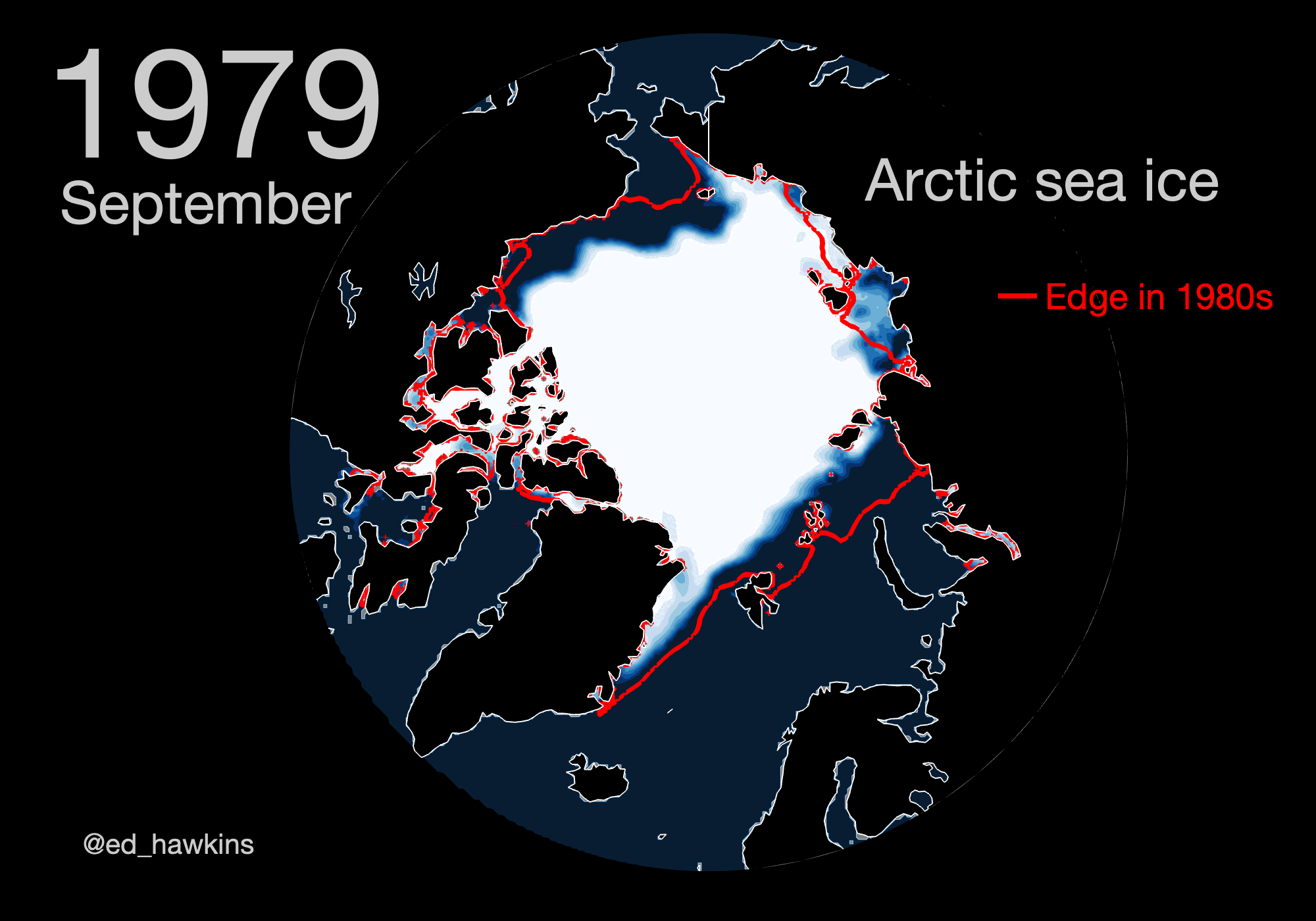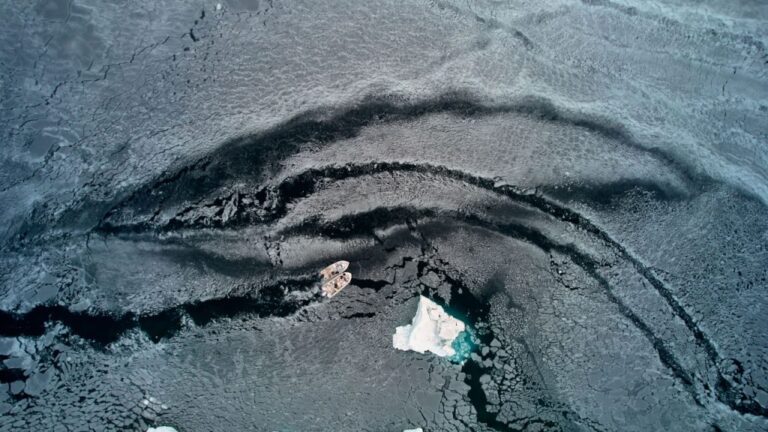A recent UK Parliament report advocates for boosted funding in research on Arctic climate change, to better understand the potential impacts on extreme weather and flooding over the UK.
Research scientists at the National Centre for Atmospheric Science and the University of Reading explain the major changes occurring across the Arctic region, how they are making projections for this region, and what the impacts of Arctic climate change are on the UK.
Understanding rapid change in the Arctic
The Arctic climate system is made up of the ocean, the atmosphere and interactions with sea ice and ice sheets.
Changes in the Arctic impact global climate systems and influence the atmosphere and the ocean in ways that can impact extreme weather in the UK and Europe.
“Some of the greatest impacts of human-caused climate change are being felt in the Arctic. Temperatures in parts of the Arctic are warming more than four times as fast as global temperatures,” outlines Professor Len Shaffrey.
“Arctic sea ice decline over the past 40 years is one of the most obvious signs that the Earth’s climate is warming,” says Professor Ed Hawkins.
Professor Hawkins goes on to explain how climate change is warming the Arctic at a faster rate than the rest of the world: “When the ocean is covered by sea ice, the ice acts as a reflective blanket that cools the region. As sea ice melts – driven by warmer global temperatures – the less reflective ocean absorbs more solar radiation, and that ocean warming leads to more sea ice melt and so on.”
September 2023 saw the sixth-lowest Arctic sea ice extent on record.
Every September the Arctic sea ice extent reaches its annual minimum, however, there is a developing trend of less sea ice each year as global temperatures increase. Climate projections indicate that Arctic summers have the potential to become seasonally sea-ice-free by the 2040s.
Professor Len Shaffrey explains, “As the Arctic climate is projected to warm, the sea ice will continue to retreat. In a few short decades, we might be looking at seasonally sea-ice free Arctic, which will have large impacts on the global climate system and weather patterns over Europe and the UK.”
Dr Ben Harvey adds, “The latest evidence suggests the Arctic will see a September which is practically ice-free before 2050, but there is strong year-to-year variability and we can’t rule out this happening as early as 2030.”
 Animated map showing the changing area of sea ice in the Arctic from the late 1970s to the present day.
Animated map showing the changing area of sea ice in the Arctic from the late 1970s to the present day.
Impacts of Arctic climate change on UK weather
Changes in the Arctic directly affect the UK’s climate and weather, and there is growing evidence that suggests changes in the Arctic will lead to more extreme weather in the UK.
The warming Arctic and rapid loss of land and sea ice will result in higher sea levels and an increased risk of coastal flooding in the UK. Warming in the Arctic might also result in shifts in atmospheric circulation.
Atmospheric circulation patterns, like the jet streams in mid-latitudes, are expected to weaken and shift as the Arctic warms. These fast-flowing bands of air draw their energy from the temperature contrast between the warm subtropical regions and the cold polar regions. By reducing that contrast as the Arctic gets warmer, it is predicted that mid-latitude jet streams will move off their usual course and to the south. This would include the North Atlantic jet stream, which is a key driver of UK weather.
“This will have an impact on the location and severity of weather in the mid-latitudes, particularly in the UK and Northwest Europe, which are strongly influenced by the North Atlantic jet stream. The types of weather we expect to be affected include droughts, heatwaves, extreme winds, and storms that lead to inland and coastal flooding,” says Dr Ben Harvey.
“But the details of these impacts, driven by Arctic warming, remain uncertain for the time being. Due to the current ability of computer models to simulate climate change and atmospheric circulation processes, it is challenging to predict short- and long-term changes to the Arctic environment.”
Severe weather – droughts, heatwaves, extreme winds, storms – pose a threat to lives and livelihoods. Between June and August 2022, there were five periods of hot weather in England and Wales, the worst of which saw temperatures in the UK exceed 40°C for the first time – and resulted in 3,200 excess deaths.
As well as being a threat to people and places, extreme weather also has major economic consequences. Flooding in the UK in winter 2019 and 2020 resulted in £150m (US$180m) worth of damage, and storms Dudley, Eunice and Franklin in February 2021 led to damages worth £3bn (US$3.7bn).
Understanding how such weather events will change over coming decades – their location, frequency and severity – is key to understanding future climate risks for the UK, and resolving the uncertainty associated with the influence of the warming Arctic is a key piece of the puzzle.
Environmental Audit Committee backs Arctic research
The UK Parliament’s Environmental Audit Committee calls for more information on Arctic ice melt, and what a changing Arctic could mean for our way of life – in a report published on October 13, 2023.
Drawing on information shared by UK experts on the Arctic, the committee outlines how limiting global warming is imperative to safeguarding the fragile Arctic environment, its communities, and global earth systems.
Environmental Audit Sub-Committee on Polar Research chair James Gray MP said, “For too long the effects of a changing Arctic have been ‘out of sight, out of mind’. Before melting glaciers and ice sheets contribute to widespread flooding and irreversible weather patterns in the UK, we must throw our full toolbox at understanding changes in the Arctic better.”
National Centre for Atmospheric Science focuses on Arctic climate research
Over 70 UK universities and research centers carry out work in a broad range of Arctic-related sciences. The National Centre for Atmospheric Science has a dedicated team of researchers working on a project known as Climate change in the Arctic – North Atlantic region and impacts on the UK (CANARI).
“The aim of CANARI is to try and better understand how the rapid changes we’re seeing in the Arctic might be affecting the weather over the UK. In particular, we’re looking at how Arctic change might be affecting weather extremes, such as storms, droughts, floods and heatwaves,” explains Professor Len Shaffrey.
CANARI will improve our capability to detect, explain and predict climate variability and changes in the Arctic, with a focus on extreme weather risk and impacts in the UK.
The CANARI team sets out to deliver a suite of state-of-the-art weather and climate model simulations, to help understand how and why the North Atlantic – Arctic climate system is changing. These include a novel ‘large ensemble’ of climate projections, which will shed light on the range of futures we can plausibly expect to see over the coming decades.
The team will also work to provide bespoke high-resolution weather simulations of extreme storms, hydrological simulations of extreme flood and drought events, and ocean simulations of the changing nature of the UK shelf seas.
This research enables the UK to play an internationally leading role in addressing the challenges of understanding climate change in the Arctic and provides detailed information about the consequences for UK people, places, and economy.



